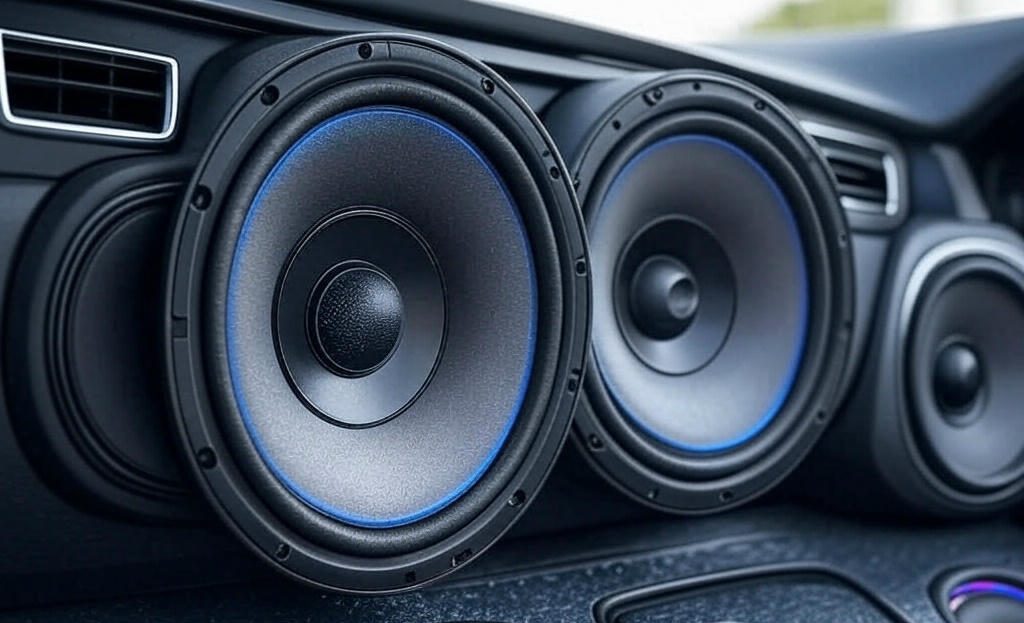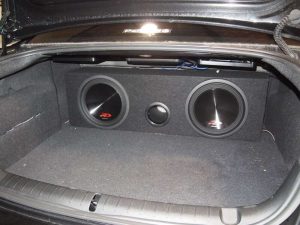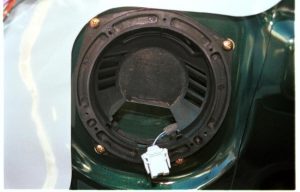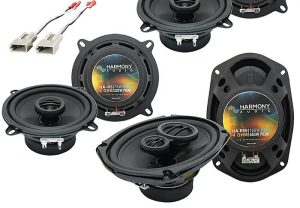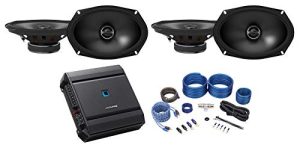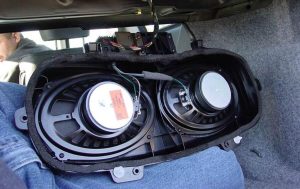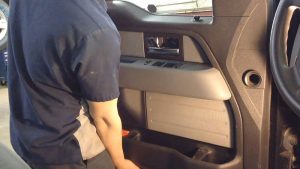Driving transforms when your car’s audio system pumps out crisp, vibrant sound. Whether you’re cruising through city streets or embarking on a cross-country road trip, the right car speakers elevate your music, podcasts, or audiobooks to a whole new level. In 2025, car audio technology continues to impress, offering budget-friendly options that rival high-end systems. After extensive research, testing, and comparisons, we’ve rounded up the best car speakers of 2025 to help you find the perfect fit for your vehicle and listening preferences.
This guide dives into five standout models: the BOSS Audio Systems CH6530, Pioneer F-Series TS-F1634R, JBL GTO629, Kenwood KFC-1666R, and JVC CS-J620. Each speaker brings unique strengths, from powerful bass to crystal-clear highs, ensuring there’s something for every audiophile. Let’s explore what makes these speakers shine, compare their features, and help you choose the ideal pair for your car audio upgrade.
Contents
- Why Upgrade Your Car Speakers in 2025?
- 1. BOSS Audio Systems CH6530 Chaos Series 6.5 Inch Car Door Speakers
- 2. Pioneer F-Series TS-F1634R 6.5” 2-Way Speakers
- 3. JBL GTO629 6.5″ Grand Touring Series Car Audio Speakers
- 4. Kenwood KFC-1666R Road Series Car Speakers
- 5. JVC CS-J620 300W 6.5″ CS Series 2-Way Coaxial Car Speakers
- Comparison Table: Best Car Speakers of 2025
- How to Choose the Best Car Speakers for Your Needs
- Installation Tips for Car Speakers
- Do You Need an Amplifier or Subwoofer?
- Final Thoughts: Which Car Speakers Should You Choose?
Why Upgrade Your Car Speakers in 2025?
Factory-installed car speakers often fall short, delivering flat or muddy sound that fails to capture the depth of your favorite tracks. Upgrading to aftermarket speakers unlocks a richer, more immersive audio experience. Here’s why 2025 is the perfect time to invest in new car speakers:
- Enhanced Sound Quality: Modern speakers use advanced materials like mica cones, balanced dome tweeters, and hybrid surrounds to produce crisp highs, smooth mids, and punchy bass.
- Affordable Excellence: Many top-tier speakers now come at budget-friendly prices, making premium audio accessible without breaking the bank.
- Easy Installation: Most 6.5-inch coaxial speakers fit seamlessly into factory speaker slots, requiring minimal modifications.
- Durability: Today’s speakers boast rugged designs, ensuring they withstand heat, humidity, and constant vibrations.
Before we dive into the reviews, let’s break down the key factors to consider when choosing car speakers: power handling (measured in watts), sensitivity (how efficiently speakers convert power into sound), frequency range (for balanced audio), and build quality (for longevity). With these in mind, let’s jump into our top picks.
1. BOSS Audio Systems CH6530 Chaos Series 6.5 Inch Car Door Speakers
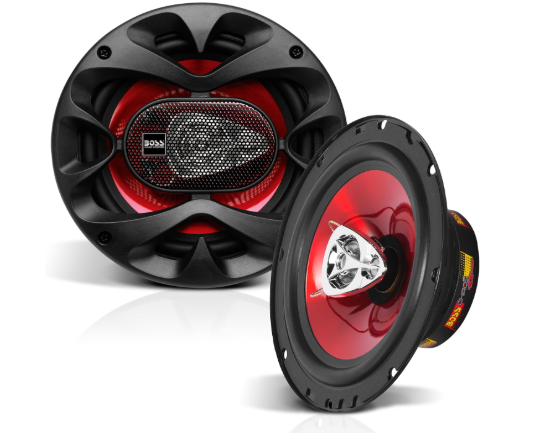
Overview
The BOSS Audio Systems CH6530 Chaos Series kicks off our list with a bang. These 6.5-inch, 3-way coaxial speakers deliver a robust 300 watts of peak power per pair, making them ideal for drivers who crave loud, dynamic sound. With a full-range design, they handle lows, mids, and highs with ease, offering a budget-friendly upgrade for any car audio system.
Key Features
- Power Handling: 300 watts peak (150 watts RMS per pair).
- Design: 3-way coaxial with a polyurethane cone, 1-inch voice coil, and 0.5-inch piezo tweeter.
- Sensitivity: 90 dB, ensuring solid performance even with low-powered stereos.
- Frequency Range: 100 Hz – 18 kHz for balanced audio.
- Impedance: 4 ohms, compatible with most car stereos.
- Durability: Rubber surround and stamped basket resist wear and tear.
Performance
The CH6530 speakers shine in delivering bold, energetic sound. The polyurethane cone produces deep, resonant bass, while the piezo tweeter ensures sparkling highs that cut through road noise. Vocals come through clearly, making these speakers a great choice for pop, rock, or podcast enthusiasts. Their 90 dB sensitivity means they perform well with factory head units, though pairing them with an external amplifier unlocks their full potential.
Installation is a breeze, thanks to their standard 6.5-inch size and included mounting hardware. The rubber surround enhances durability, ensuring these speakers withstand long drives and harsh conditions. However, for bass-heavy genres like hip-hop or EDM, you may want to pair them with a subwoofer for extra low-end punch.
Pros
- Affordable price point for high power output.
- Clear highs and solid mids for versatile listening.
- Easy to install in most vehicles.
- Durable build for long-term use.
Cons
- Bass could be deeper for bass-heavy music.
- May require an amplifier for optimal performance.
Who It’s For
The BOSS CH6530 is perfect for budget-conscious drivers seeking a noticeable upgrade over stock speakers without spending a fortune. It’s a great fit for casual listeners who enjoy a variety of music genres and want reliable, loud sound.
2. Pioneer F-Series TS-F1634R 6.5” 2-Way Speakers
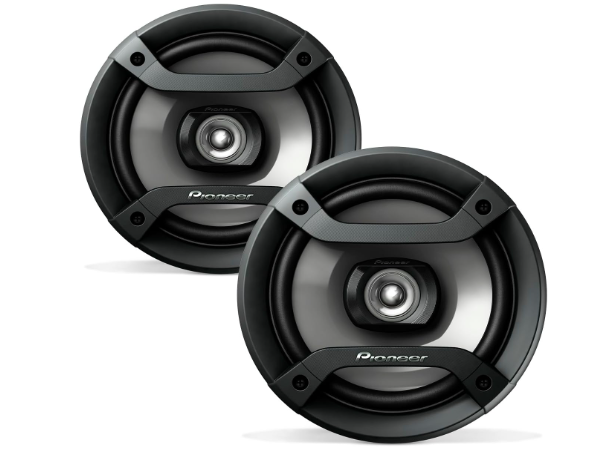
Overview
Pioneer has long been a titan in car audio, and the F-Series TS-F1634R upholds that legacy. These 6.5-inch, 2-way coaxial speakers deliver 200 watts of peak power, offering warm sound, smooth treble, and impressive clarity. Designed as high-efficiency replacements for OEM speakers, they’re a fantastic choice for drivers seeking balanced audio on a budget.
Key Features
- Power Handling: 200 watts peak (25 watts RMS per speaker).
- Design: 2-way coaxial with a polypropylene cone and 1.18-inch balanced dome tweeter.
- Sensitivity: 88 dB, optimized for low-power systems.
- Frequency Range: 31 Hz – 16 kHz for rich lows and clear highs.
- Impedance: 4 ohms, ensuring broad compatibility.
- Build: Lightweight design with a shallow mounting depth (1.81 inches).
Performance
The TS-F1634R speakers excel at producing warm, well-balanced sound. Their polypropylene cone delivers punchy bass and smooth mids, while the balanced dome tweeter ensures crisp, distortion-free treble. With a frequency range dipping to 31 Hz, these speakers handle low-end frequencies better than many competitors, making them versatile for rock, jazz, or classical music. Their 88 dB sensitivity ensures decent volume even with factory stereos, though an amplifier enhances their dynamics.
These speakers are a dream to install, thanks to their shallow mounting depth and included adapters. They fit snugly into most vehicles, making them a go-to for DIY upgrades. While they lack the raw power of higher-wattage models, their efficiency and clarity make them a standout for stock system replacements.
Pros
- Warm, balanced sound with smooth treble.
- Excellent low-end response for a 2-way speaker.
- Easy installation with shallow mounting depth.
- Budget-friendly price.
Cons
- Limited power handling compared to 3-way models.
- May lack punch for high-volume listeners.
Who It’s For
The Pioneer TS-F1634R is ideal for drivers upgrading from factory speakers who want clear, balanced sound without needing an external amplifier. It’s perfect for audiophiles on a budget who prioritize fidelity over sheer volume.
3. JBL GTO629 6.5″ Grand Touring Series Car Audio Speakers
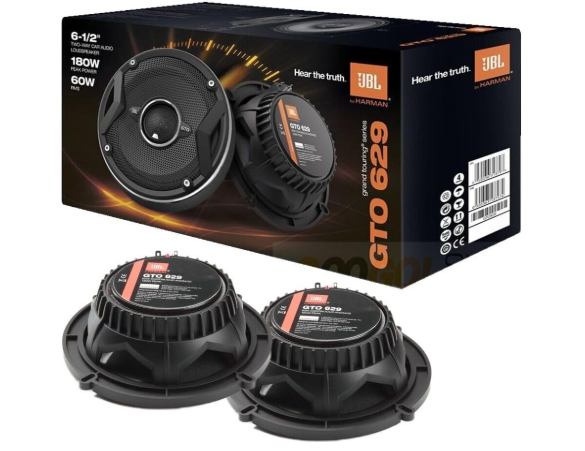
Overview
JBL is synonymous with premium audio, and the GTO629 Grand Touring Series brings that expertise to your car. These 6.5-inch, 2-way coaxial speakers boast 360 watts of peak power, delivering rich, detailed sound with powerful bass. Bundled with an Iron Crush cleaning cloth, they’re a factory-sized replacement that elevates any car audio system.
Key Features
- Power Handling: 360 watts peak (120 watts RMS per pair).
- Design: 2-way coaxial with carbon-injected Plus One cone, 1-inch edge-driven soft dome tweeter.
- Sensitivity: 93 dB, ideal for low- and high-power systems.
- Frequency Range: 53 Hz – 21 kHz for extended highs and solid lows.
- Impedance: 3 ohms, maximizing power from your stereo.
- Build: Patented I-Mount tweeter system for flexible installation.
Performance
The JBL GTO629 speakers impress with their vibrant, full-range sound. The carbon-injected Plus One cone moves more air, producing deep, authoritative bass that rivals pricier models. The edge-driven tweeter delivers crystal-clear highs, ensuring vocals and instruments shine. With a 93 dB sensitivity, these speakers thrive with both factory head units and amplified systems, making them versatile for any setup.
Installation is straightforward, and the patented I-Mount system allows tweeter adjustments for optimal soundstaging. Their 3-ohm impedance draws more power from your stereo, boosting efficiency. While they excel across genres, bass enthusiasts may still want a subwoofer for ultra-low frequencies. The included cleaning cloth is a nice touch for keeping your car’s interior pristine.
Pros
- Powerful bass and clear highs for premium sound.
- High sensitivity for versatile performance.
- Flexible installation with adjustable tweeters.
- Durable, high-quality build.
Cons
- Slightly pricier than budget options.
- Bass may not satisfy subwoofer-level expectations.
Who It’s For
The JBL GTO629 is perfect for audiophiles who want premium sound without a massive investment. It’s a great choice for drivers upgrading factory systems who value clarity, bass, and build quality.
4. Kenwood KFC-1666R Road Series Car Speakers
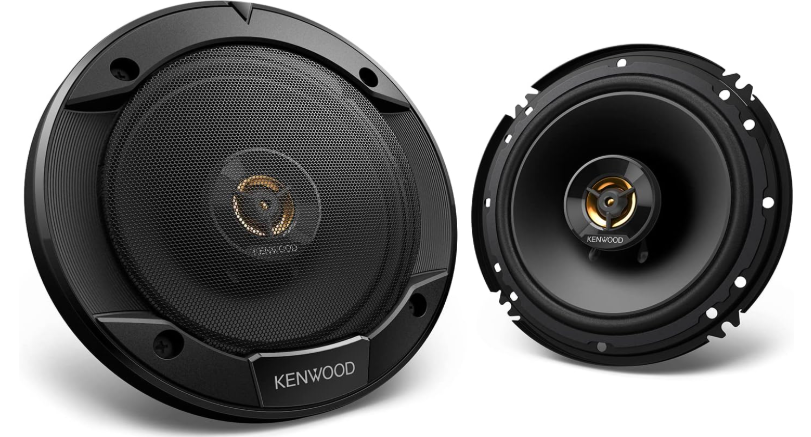
Overview
Kenwood’s KFC-1666R Road Series combines affordability with quality, offering 300 watts of peak power in a 6.5-inch, 2-way coaxial package. With a cloth woofer, balanced dome tweeter, and heavy-duty magnet, these speakers deliver crisp audio and reliable performance, making them a solid choice for everyday drivers.
Key Features
- Power Handling: 300 watts peak (30 watts RMS per speaker).
- Design: 2-way coaxial with a polypropylene cloth woofer and 1-inch balanced dome tweeter.
- Sensitivity: 90 dB, suitable for factory stereos.
- Frequency Range: 40 Hz – 22 kHz for wide-ranging audio.
- Impedance: 4 ohms, compatible with most systems.
- Build: Heavy-duty magnet and shallow 1.69-inch mounting depth.
Performance
The KFC-1666R speakers strike a balance between clarity and power. The cloth woofer produces tight, accurate bass, while the balanced dome tweeter ensures bright, detailed highs. Their wide frequency range (40 Hz – 22 kHz) captures subtle nuances in vocals and instruments, making them versatile for pop, country, or classical music. With 90 dB sensitivity, they perform admirably with low-power head units, though an amplifier enhances their output.
Their shallow mounting depth (1.69 inches) makes installation a snap, fitting most vehicles without modifications. The heavy-duty magnet ensures consistent performance, even during long drives. While they don’t match the bass depth of 3-way speakers, their clarity and affordability make them a strong contender.
Pros
- Crisp highs and accurate bass for balanced sound.
- Wide frequency range for detailed audio.
- Easy to install with shallow depth.
- Affordable yet reliable.
Cons
- Bass lacks depth for bass-heavy genres.
- RMS power is lower than some competitors.
Who It’s For
The Kenwood KFC-1666R is ideal for drivers seeking a budget-friendly upgrade with clear, reliable sound. It’s perfect for casual listeners who want better audio without complex installations.
5. JVC CS-J620 300W 6.5″ CS Series 2-Way Coaxial Car Speakers
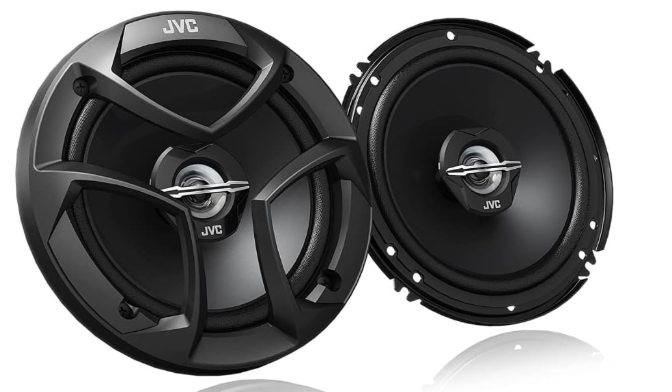
Overview
Rounding out our list, the JVC CS-J620 CS Series offers incredible value with 300 watts of peak power in a 6.5-inch, 2-way coaxial design. Featuring a mica cone woofer and PEI tweeter, these speakers deliver solid performance and easy installation, making them a go-to for budget-conscious audiophiles.
Key Features
- Power Handling: 300 watts peak (30 watts RMS per speaker).
- Design: 2-way coaxial with a mica cone woofer and 1-inch PEI tweeter.
- Sensitivity: 92 dB, efficient with low-power systems.
- Frequency Range: 35 Hz – 22 kHz for broad audio coverage.
- Impedance: 4 ohms, widely compatible.
- Build: Hybrid rubberized cloth surround for durability.
Performance
The JVC CS-J620 speakers impress with their lively, detailed sound. The mica cone woofer delivers punchy bass and clear mids, while the PEI tweeter produces bright, articulate highs. Their 92 dB sensitivity ensures strong output even with factory stereos, making them a great plug-and-play option. The 35 Hz – 22 kHz frequency range captures everything from deep basslines to soaring vocals, suiting a wide range of genres.
Installation is effortless, thanks to their standard size and included mounting hardware. The hybrid surround enhances durability, ensuring these speakers last through years of use. While they don’t rival premium models in bass depth, their clarity and value are hard to beat.
Pros
- Bright, detailed sound with solid bass.
- High sensitivity for efficient performance.
- Easy installation and durable build.
- Exceptional value for the price.
Cons
- Bass may feel light for EDM or hip-hop.
- RMS power is modest.
Who It’s For
The JVC CS-J620 is perfect for budget-minded drivers who want clear, vibrant sound without complex setups. It’s ideal for casual listeners upgrading factory speakers on a tight budget.
Comparison Table: Best Car Speakers of 2025
| Speaker Model | Peak Power | RMS Power | Sensitivity | Frequency Range | Impedance | Best For |
|---|---|---|---|---|---|---|
| BOSS CH6530 | 300W | 150W | 90 dB | 100 Hz – 18 kHz | 4 ohms | Budget power seekers |
| Pioneer TS-F1634R | 200W | 50W | 88 dB | 31 Hz – 16 kHz | 4 ohms | Balanced sound enthusiasts |
| JBL GTO629 | 360W | 120W | 93 dB | 53 Hz – 21 kHz | 3 ohms | Premium audio lovers |
| Kenwood KFC-1666R | 300W | 60W | 90 dB | 40 Hz – 22 kHz | 4 ohms | Clarity-focused drivers |
| JVC CS-J620 | 300W | 60W | 92 dB | 35 Hz – 22 kHz | 4 ohms | Budget-conscious audiophiles |
How to Choose the Best Car Speakers for Your Needs
Selecting the right car speakers depends on your audio preferences, vehicle, and budget. Here are key factors to guide your decision:
- Speaker Type: Coaxial speakers (like our top picks) combine woofers and tweeters in one unit, offering easy installation and full-range sound. Component speakers separate these elements for better soundstaging but require more complex setups.
- Power Handling: Check peak (maximum) and RMS (continuous) power ratings. Higher RMS ensures consistent performance. Match your speakers’ power to your stereo or amplifier.
- Sensitivity: Speakers with higher sensitivity (e.g., 90 dB or above) work well with low-power factory stereos, while lower sensitivity models may need an amplifier.
- Frequency Range: A wider range (e.g., 35 Hz – 22 kHz) captures more audio detail, from deep bass to high treble.
- Impedance: Most car speakers are 4 ohms, but lower impedance (e.g., JBL’s 3 ohms) can draw more power for louder sound.
- Size and Fit: Ensure the speakers match your vehicle’s factory slots (6.5 inches is standard). Check mounting depth for compatibility.
- Build Quality: Look for durable materials like polypropylene, mica, or carbon-injected cones and rubber surrounds for longevity.
Installation Tips for Car Speakers
Upgrading your car speakers is a manageable DIY project with the right approach. Follow these steps for a smooth installation:
- Gather Tools: You’ll need a screwdriver, wire cutters, crimping tool, and possibly a panel removal tool.
- Check Compatibility: Confirm the speakers fit your vehicle’s speaker slots and wiring.
- Remove Old Speakers: Carefully pop off door panels or grilles, unscrew the old speakers, and disconnect the wiring.
- Connect New Speakers: Use the included wiring harness or crimp connectors to attach the new speakers. Ensure positive and negative terminals align.
- Test Before Securing: Play audio to verify the speakers work, then screw them into place.
- Reassemble Panels: Snap panels or grilles back on, ensuring a snug fit.
For complex setups or if you’re unsure, consult a professional installer to avoid damaging your vehicle.
Do You Need an Amplifier or Subwoofer?
While our top picks perform well with factory stereos, adding an amplifier or subwoofer can take your audio to the next level:
- Amplifier: Boosts power to your speakers, improving clarity and volume. It’s especially useful for low-sensitivity speakers or if you love cranking the volume.
- Subwoofer: Enhances low-end frequencies for bass-heavy music like hip-hop or EDM. If you choose speakers like the BOSS CH6530 or JVC CS-J620, a subwoofer can fill in the missing depth.
Check your vehicle’s space and budget before adding these components, as they require additional wiring and installation.
Final Thoughts: Which Car Speakers Should You Choose?
The best car speakers of 2025 cater to a range of budgets and audio preferences, ensuring every driver finds the perfect match. Here’s a quick recap to guide your decision:
- BOSS Audio Systems CH6530: Best for budget-conscious drivers who want loud, reliable sound with easy installation.
- Pioneer F-Series TS-F1634R: Ideal for balanced, warm audio and seamless OEM replacements on a budget.
- JBL GTO629: Perfect for audiophiles seeking premium sound with powerful bass and flexible installation.
- Kenwood KFC-1666R: Great for clarity-focused listeners who need affordable, durable speakers.
- JVC CS-J620: The go-to for budget buyers wanting vibrant sound and high efficiency.
For most drivers, the JBL GTO629 stands out as the top choice, offering premium sound, high sensitivity, and versatile performance. If you’re on a tighter budget, the JVC CS-J620 delivers exceptional value without sacrificing quality. Whichever you choose, these speakers will transform your driving experience with crystal-clear audio.
Ready to upgrade your car audio? Pick your favorite from our list and hit the road with music that sounds better than ever. Share your thoughts or questions in the comments below—we’d love to hear about your audio journey!
FAQs
Q: What are the best car speakers for bass in 2025?
The JBL GTO629 offers the deepest bass among our picks, thanks to its carbon-injected Plus One cone. For even more low-end, pair any speaker with a subwoofer.
Q: Can I install these speakers myself?
Yes, all five speakers are designed for easy installation in 6.5-inch factory slots. Follow our installation tips or consult a professional for complex setups.
Q: Do I need an amplifier for these speakers?
Most of our picks work well with factory stereos, but an amplifier enhances volume and clarity, especially for the Pioneer TS-F1634R or Kenwood KFC-1666R.
Q: Are these speakers compatible with my car?
The 6.5-inch size fits most vehicles, but check your car’s speaker slots and mounting depth. Brands like Crutchfield offer compatibility tools to confirm fitment.
Q: How long do car speakers last?
With proper care, quality speakers like these can last 5–10 years, depending on usage and environmental conditions.
